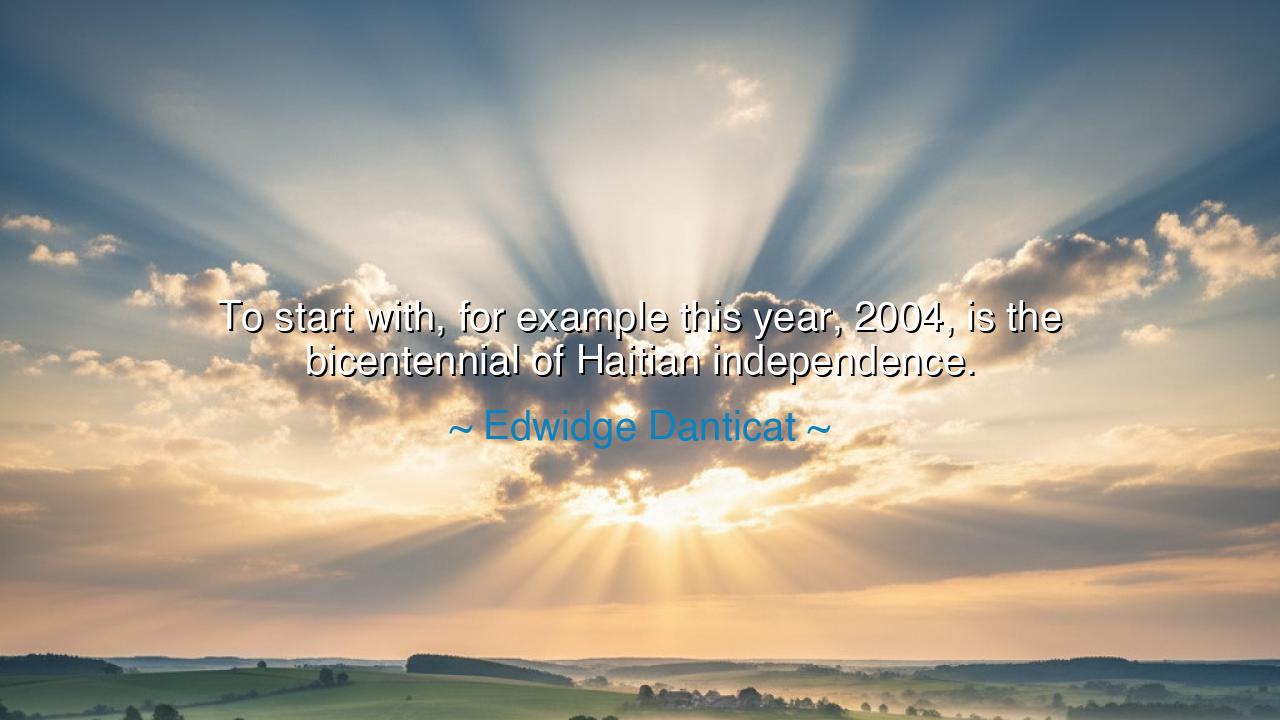
To start with, for example this year, 2004, is the bicentennial
To start with, for example this year, 2004, is the bicentennial of Haitian independence.






When Edwidge Danticat said, “To start with, for example this year, 2004, is the bicentennial of Haitian independence,” she was not merely marking a date on a calendar — she was summoning the memory of a revolution, a triumph of courage and sacrifice that changed the world. In her words, the year 2004 stood as a sacred milestone — two hundred years since Haiti, the first free Black republic, rose from the ashes of slavery and declared its independence from one of the mightiest empires on earth. Danticat, herself a child of Haiti and a voice for its people, invoked this anniversary not only to honor history, but to remind humanity of what freedom truly costs — and what it means to hold it sacred.
The origin of this quote lies in the context of Danticat’s writings and speeches, where she often reflects on the legacy of Haiti’s revolution and its deep scars. For her, 2004 was more than a commemoration; it was a reckoning. Haiti’s independence in 1804, led by the enslaved and the oppressed, was a beacon for all who sought liberation. Yet, two centuries later, the nation still bore the weight of betrayal, debt, and poverty imposed by those who could not forgive its defiance. In recalling the bicentennial, Danticat was holding up a mirror to the world — showing that freedom without justice is fragile, and that the struggle for dignity does not end with the signing of a declaration, but continues through every generation that remembers.
To understand the gravity of her words, one must return to the fire of the Haitian Revolution itself — the uprising led by Toussaint Louverture, Jean-Jacques Dessalines, and countless unnamed heroes who transformed chains into weapons and despair into faith. Against the armies of France, Spain, and Britain, the enslaved people of Saint-Domingue rose and conquered. In 1804, they did what no other enslaved population in history had done: they overthrew their masters, abolished slavery, and founded a free republic. But the victory was costly — the world, fearful of their example, punished Haiti with isolation and crushing reparations. The freedom they had won with blood became shackled again by economic and political bondage.
Danticat’s reminder, then, carries both pride and sorrow. To speak of Haitian independence is to speak of humanity’s highest and lowest moments — of bravery and betrayal, of hope and hardship. It is to recognize that liberty is not given but seized, and that its enemies do not disappear when the war ends; they simply change their faces. Even two hundred years later, Haiti’s struggle stood as a testament to endurance. The nation that once defied empires was still defying despair. In the rhythm of Danticat’s words, there is reverence — but also a challenge: what do we, the inheritors of that legacy, do with the freedom others died to give us?
Her reflection can also be seen as a message to all peoples and nations who have forgotten their beginnings. Like the ancients who celebrated their victories with solemn remembrance, she reminds us that independence must be renewed through memory. When the world forgets the courage of Haiti, it forgets the truth of freedom itself — that the oppressed are capable of greatness, and that the powerful can fall. The bicentennial, for Danticat, was not an ending but a reawakening — a call for Haiti, and for all humanity, to reclaim the dignity that oppression seeks to erase.
In her tone, we hear not the historian, but the poet of exile — one who speaks from the space between grief and glory. For Danticat, 2004 was both celebration and lamentation. It was the echo of Dessalines’ cry for freedom, mingled with the quiet suffering of a nation still paying for its audacity to be free. Yet she does not speak with bitterness. Instead, she invites her listeners to see Haiti not as a symbol of tragedy, but as a mirror of resilience — proof that even the most broken soil can give birth to freedom’s first fruit.
So, my children of memory and hope, take this lesson to heart: independence is not a date, but a discipline. It must be guarded not only by arms but by remembrance, by art, by truth. Let the story of Haiti remind you that no victory is complete until justice is secure, and no freedom endures unless it is renewed by courage. Celebrate your milestones, yes, but never sleep upon them. For every generation must rise, as the Haitians once did, and claim once more the sacred right to stand free beneath the sun.






AAdministratorAdministrator
Welcome, honored guests. Please leave a comment, we will respond soon